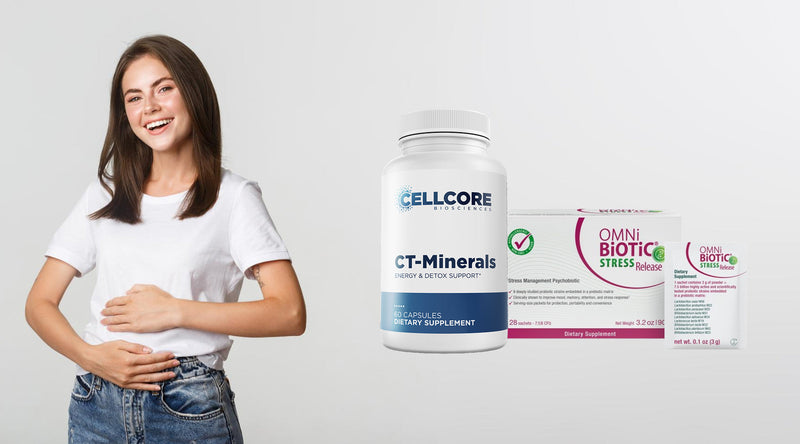As you navigate the complexities of modern life, it's easy to overlook the intricate balance of your digestive system. However, ignoring the subtle signs of digestive distress can lead to issues from bloating and fatigue to compromised immunity.
Fortunately, incorporating the best dietary supplements can help restore harmony to your gut and promote overall well-being. In this article, we'll explore the most effective supplements to support your digestive health, empowering you to take control of your body's internal ecosystem and unlock a path to vitality and resilience.
The Importance of Digestive Health
Digestive health is often overlooked but is vital for your overall well-being. A healthy digestive system breaks down food, absorbs nutrients, and eliminates waste efficiently, which in turn supports energy levels, immune function, and even mental health. When your digestive system is out of balance, you may experience a range of symptoms that can impact your daily life.
The Gut-Brain Connection
For optimal digestive health, it's necessary to recognize the intricate relationship between your gut & brain. The gut & brain are connected through the gut-brain axis, a bidirectional communication network that influences mood, cognitive function, and overall health. A healthy gut microbiome produces neurotransmitters and hormones that communicate with your brain, regulating appetite, metabolism, and stress response. Therefore, it is essential to have gut-brain detox supplements.
Probiotics: The Friendly Bacteria

Some of the most effective dietary supplements for supporting digestive health are probiotics, which have been gaining popularity in recent years due to their numerous benefits for overall well-being.
What Are Probiotics?
The term "probiotic" refers to live microorganisms that, when taken in adequate amounts, confer various health benefits. Or we can say, probiotics are the "good" bacteria that can create a healthy balance of gut flora.
Benefits of Probiotics for Digestive Health
Bacteria in your gut play a major role in digestion, and an imbalance of gut flora can lead to various digestive issues. Probiotics can help restore this balance, promoting a healthy digestive system.
It's worth noting that probiotics have been shown to lessen symptoms of irritable bowel syndrome (IBS), such as bloating, abdominal pain, and bowel irregularity.
Choosing the Right Probiotic Supplement
Understanding the different strains of probiotics & their specific benefits can also help you make an informed decision. For example, Lactobacillus acidophilus & Bifidobacterium bifidum are two of the most well-studied strains, which have been shown to support digestive health & boost immunity. You can choose Omni Biotic AB 10, specially designed to restore gut microbiome balance.
Fiber Supplements for a Healthy Gut
Now, let's explore the world of fiber supplements, an imperative component of a healthy digestive system.
The Role of Fiber in Digestion
Fiber plays a vital role in digestion, acting as a prebiotic that feeds the good bacteria, promoting a healthy gut microbiome. It also helps regulate bowel movements, prevent constipation, and support healthy blood sugar levels.
Types of Fiber Supplements
Fibrous supplements come in various forms, each with its unique benefits and characteristics. Some of the most common types include:
- Psyllium husk
- Methylcellulose
- Pectin
- Guar gum
- Inulin
Tips for Incorporating Fiber into Your Diet
One of the most effective ways to support your digestive health is by incorporating fiber-rich foods into your diet. Aim to take a variety of fruits, vegetables, and legumes.
- Increase your fiber intake slowly so that to avoid digestive discomfort
- Drink more water to help fiber move through your digestive system
- Knowing your body's response to different fiber sources will help you make informed choices.
Omega-3 Fatty Acids for Inflammation Reduction
Keep your digestive system running smoothly by taking omega-3 fatty acids into your supplement routine. These necessary fatty acids have potent anti-inflammatory properties, which can help alleviate digestive discomfort and promote overall health.
Food Sources vs. Supplements
Omega-rich foods like fatty fish, flaxseeds, and walnuts are excellent additions to your diet. However, it can be challenging to get enough omega-3s from food sources alone, especially if you do not take fish or have dietary restrictions. A high-quality supplement can help bridge the gap and ensure you're getting enough omega-3s to support your digestive health.
Digestive Enzymes: Unlocking Nutrient Absorption
For optimal digestive health, your body relies on these enzymes to break down the food into nutrients that can be absorbed & utilized by your body. Without sufficient digestive enzymes, you may experience digestive discomfort, bloating, and nutrient deficiencies.
How Digestive Enzymes Work
For efficient digestion, digestive enzymes work together to break down carbohydrates, proteins & fats into smaller molecules that can be absorbed by your body. This process occurs in the mouth, stomach, and small intestine, where specific enzymes target different types of nutrients.
Benefits of Supplementing with Digestive Enzymes
Supplementing with digestive enzymes can help reduce digestive discomfort, reduce symptoms of irritable bowel syndrome (IBS), and improve nutrient absorption. By ensuring your body has an adequate supply of digestive enzymes, you can optimize your digestive health and overall well-being.
Absorption of necessary nutrients is critical for maintaining optimal health. By supplementing with digestive enzymes, you can enhance your body's ability to absorb vital nutrients, including vitamins, minerals, and amino acids.
Prebiotics: Fuel for the Good Bacteria
Once again, the focus shifts to the microbiome, where prebiotics play a crucial role in maintaining a healthy balance of gut bacteria. By fueling the good bacteria, prebiotics help create an environment that supports your overall digestive well-being.
What Are Prebiotics?
Prebiotic fibers are non-digestible carbohydrates that serve as food for beneficial microorganisms in your gut. They help stimulate the growth & activity of these good bacteria, promoting a healthy gut microbiome.
Benefits of Prebiotics for Digestive Health
What makes prebiotics so valuable is their ability to enhance the colonization of beneficial bacteria in your gut, leading to a range of benefits for your digestive health.
Digestive regularity, reduced symptoms of irritable bowel syndrome (IBS), and even weight management are just a few of the advantages you can experience when you incorporate prebiotics into your diet.
Food Sources and Supplements
Prebiotic-rich foods like asparagus, bananas, onions, and whole wheat bread can be easily incorporated into your diet. However, if you're struggling to get enough from whole foods alone, supplements can provide a convenient and effective solution.
The key is to look for supplements that contain a blend of different prebiotic fibers, such as inulin, fructooligosaccharides (FOS), and galactooligosaccharides (GOS). This will help ensure that you're providing a diverse range of beneficial bacteria with the fuel they need to thrive.
Conclusion
Considering all points, it's clear that incorporating dietary supplements into your routine can have a profound impact on your digestive health. By choosing the best dietary supplements, such as probiotics, prebiotics, and omega-3 fatty acids, you can promote a balanced gut microbiome, reduce symptoms of digestive disorders, and even boost your overall well-being. Bear in mind that a healthy gut is necessary for a healthy body, so take control of your digestive health today and start experiencing the benefits for yourself.








